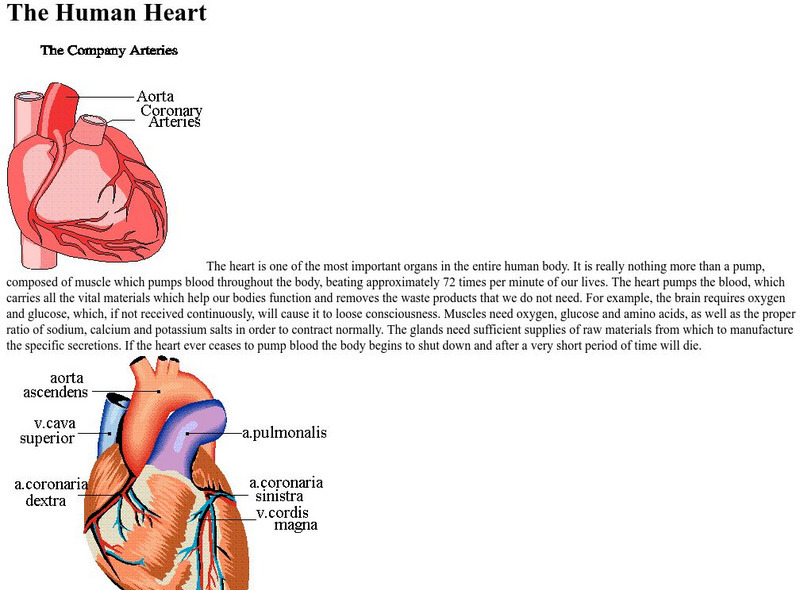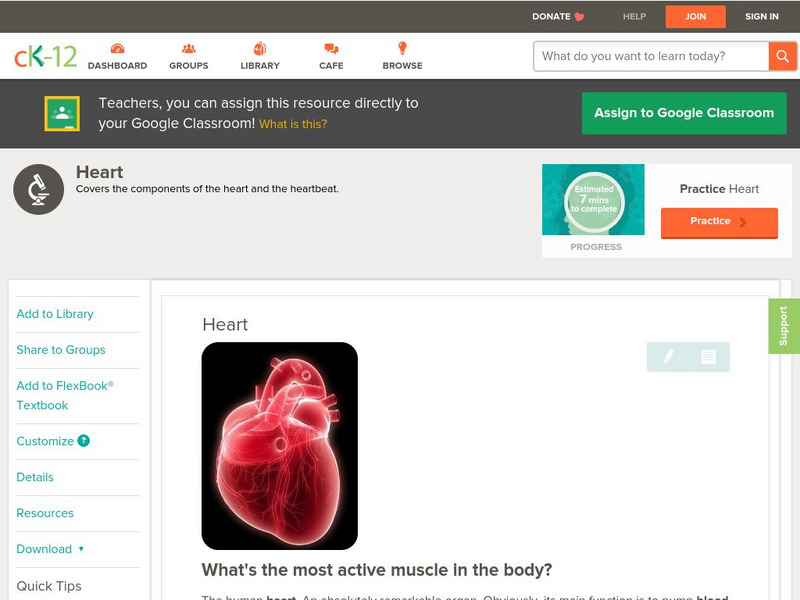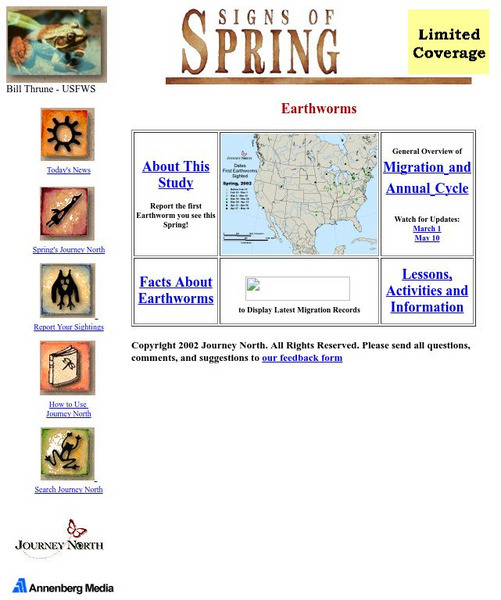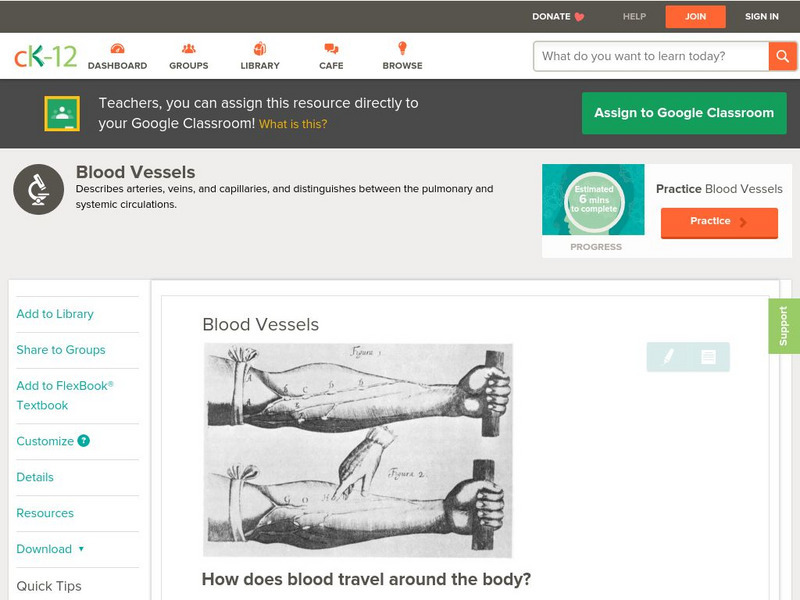Hi, what do you want to do?
University of Utah
University of Utah: Cardiovascular Pathology Index
This site features a detailed index of photographs for cardiovascular pathology. You can see what a normal human heart looks like and what a sick one looks like too. Come and check it out.
Curated OER
Kids Health: Blood
This comprehensive site from Kids Health provides an indepth look at the characteristics of blood, its functions, and its importance. This site is a great starting point for understanding blood. Also includes links to similar sites.
National Institutes of Health
Pdf: Prevention of Heart Disease (Spanish) [Pdf]
A downloadable PDF comic book in Spanish with information on how to prevent heart disease and promote healthy hearts.
National Institutes of Health
Nhlbi: Heart Health and Prevention of Heart Disease [Pdf]
A downloadable PDF comic booklet with information on how to prevent heart disease and promote healthy hearts.
CK-12 Foundation
Ck 12: Biology: Heart
[Free Registration/Login may be required to access all resource tools.] Describes how the heart pumps blood throughout the body.
PBS
Pbs Nova Online: Amazing Heart Facts
This concise PBS NOVA site contains interesting facts about the heart and how it works.
Other
Read Works: The Human Body: The Human Heart [Pdf]
An informational text about the human heart, its parts, and it functions. A question sheet is available to help students build skills in reading comprehension.
PBS
Pbs Teachers:scientific American: Affairs of the Heart: Exploring Vessel Physics
Explore the relationship between pressure and vessel diameter and create a model that represents how elevated blood pressure may affect weakened vessels. Design and critique a repair device.
PBS
Pbs Teachers: Scientific American: Body Building: One Way Valves
Investigate biotechnology design by creating a model of a one-way valve from plastic tubing. Describe the mechanical action of the valve.
Annenberg Foundation
Annenberg Learner: Journey North: Facts About Earthworms
A comprehensive resource on earthworms, offering the following sections: "Facts about Earthworms," "Migration and Annual Cycle," and "Lessons Activities and Information."
PurposeGames
Purpose Games: The Heart
Test your knowledge of the heart by finding the different parts in this 13 question quiz.
CK-12 Foundation
Ck 12: Biology: Blood Vessels
[Free Registration/Login may be required to access all resource tools.] Discusses the different types of blood vessels and their roles.
WebMD
Web Md: Congenital Heart Disease
WebMD offers information on congenital heart disease, including types, symptoms, diagnosis, and treatment.
CK-12 Foundation
Ck 12: Life Science: Heart
[Free Registration/Login may be required to access all resource tools.] What does the heart look like? How does it pump blood? Learn more about the heart in this learning module produced by CK-12.
PBS
Nova Online: Map of the Human Heart
This PBS site has a concise explanation of how the heart works. There is also a moving diagram of a working heart.
Remedy Health Media
Health Central: Heart Disease
This resource provides an overview about heart disease.
Khan Academy
Khan Academy: Chronic Myelogenous Leukemia and the Philadelphia Chromosome
Read this passage and study the graphic to complete the five-question quiz related to the Chronic myelogenous leukemia and Philadelphia Chromosome.
Khan Academy
Khan Academy: Blood Oxygen Levels May Determine Cardiac Muscle Regeneration
Practice for the MCAT by answering questions based on the given bar graphs showing apoptosis and cytokinesis rates.
Khan Academy
Khan Academy: Molarity vs.osmolarity
Molarity and osmolarity are two distinct concepts. Molarity (M) is the number of moles of solute per liter of solution. The unit of molarity is the mole (mol). Osmolarity (Osm/L) is the total concentration of all solutes in the solution....
Khan Academy
Khan Academy: Molarity vs. Molality
Learn how molarity and molality differ. The molality of a solution is equal to the moles of solute divided by the mass of solvent in kilograms, while the molarity of a solution is equal to the moles of solute divided by the volume of...
Khan Academy
Khan Academy: The Mole and Avogadro's Number
An explanation the mole (named for molecule) and Avogadro's Number. One mole of a substance is equal to 6.022 times 10 to 23rd power units of that substance (such as atoms, molecules, or ions). The number 6.022 time 10 to 23rd power is...
Khan Academy
Khan Academy: Introduction to Lab Values and Normal Ranges
An introduction to lab values and normal ranges of a blood analysis. A universal model for lab values is explained. Reasons for a value not being with a normal range is discussed.
Khan Academy
Khan Academy: Introduction to Lab Values and Normal Ranges
An explanation of lab values following a blood test using a universal model. Also discussed are reasons why a number may be outside of a normal range. These variances include: age, gender, individual laboratory techniques, and the given...
Other popular searches
- Circulatory System Diagram
- Circulatory System Worksheet
- Heart and Circulatory System
- Circulatory System Unit
- The Circulatory System
- Circulatory System Higher
- Sea Otter Circulatory System
- Avian Circulatory System
- Gorillas Circulatory System
- Circulatory System. Exercise
- Circulatory System Parts
- Circulatory System Models
























